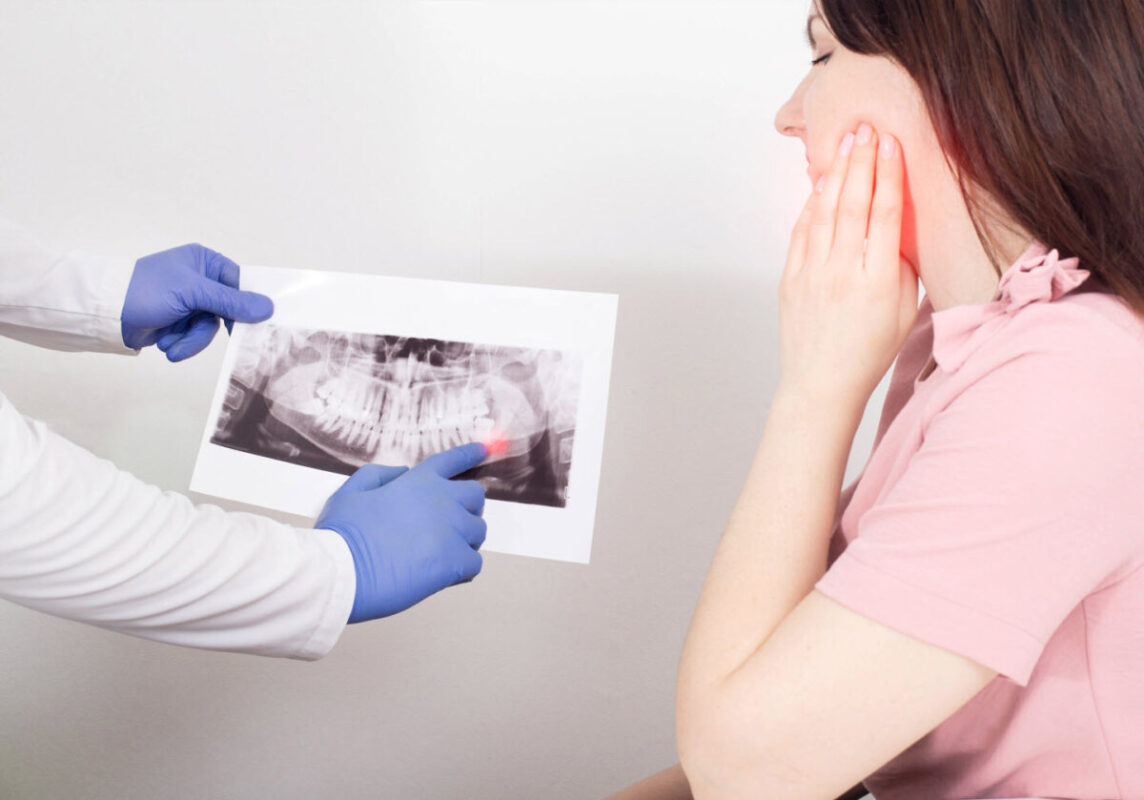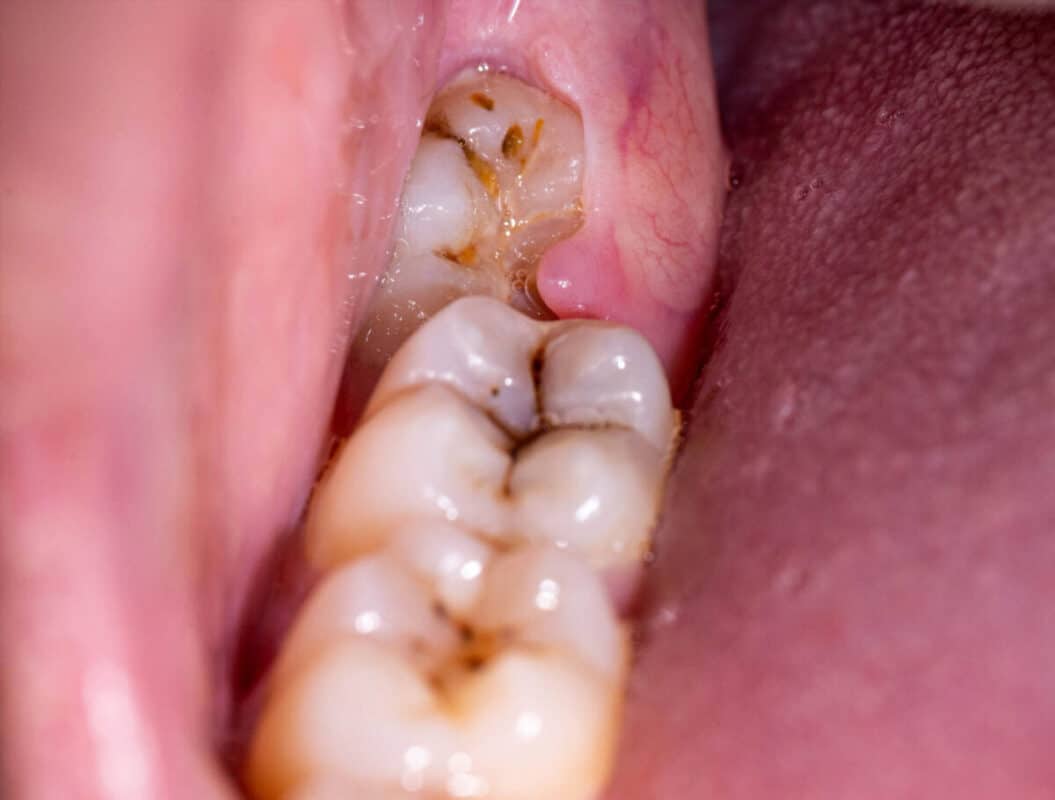Is Wisdom Tooth Extraction Painful?
Dentists numb the tooth before removal. Therefore you should not feel any pain except the pressure of the forces required for the removal. If you feel pain during the removal procedure, let your dentist know so they can give you more anaesthetic.
Alternatively, you can consider removal under happy gas to ease dental anxiety or even consider removal of wisdom tooth under general anaesthesia (sleep dentistry) if you prefer to be unconscious when it happens.

What are wisdom teeth?
The third tooth (molar) is called the wisdom tooth. The reason for naming this tooth as wisdom tooth is the age of growing this tooth, which can occur around the age of 17. There are four wisdom teeth in the jaw; the last teeth in the jaw arch.
The wisdom tooth is the last tooth to grow. It usually appears between the age of 17 and 25. If it has enough space and grows completely in the mouth, it will not cause a problem for the person. But in most cases, such as hereditary reasons, these teeth are impacted or semi-impacted, which can cause many problems. Therefore, dentists recommend wisdom tooth extraction at the right time.
Impacted wisdom teeth can cause many problems for patients for a long time without the patient’s awareness, and delaying tooth extraction can have irreversible consequences. So, if needed, wisdom teeth extraction before the age of 25 to 30 is strongly recommended.
A dentist will recommend this surgery if an examination and X-rays show that your wisdom teeth are impacted, or it may cause dental problems for you in the future. Not everyone has wisdom teeth, but most people have one to four.
Contraindications
Wisdom tooth removal surgery before age 20 is easier than higher ages, but it can be complicated.
At this age, tooth roots are not formed completely. When older, roots become longer, curved, and more difficult to extract.

Reasons to extract wisdom teeth
- Orthodontic treatment
- Pain
- Tooth decay (If the location of the wisdom tooth is not suitable, it decays; because food particles remain between the wisdom teeth and other teeth, causing them to decay)
- Impacted wisdom tooth
- Root fracture in the tooth
- Need for dentures
- Teeth with pathological lesions
- They may put pressure on your other teeth (If the position and location of the wisdom tooth are not suitable, it can damage the surrounding teeth. It also damages the jaw and even the nerves around it.
- Lack of space in the mouth can cause problems for other teeth’s growth.
If you are in pain from an impacted wisdom tooth, it is best to make an appointment with an emergency dentist in Brisbane urgently because a dental abscess can grow quickly in a day or two and when it happens it can become very painful.

How are wisdom teeth extracted?
If your wisdom tooth has enough space, grows completely in the jaw, and needs to be extracted, it usually will not need surgery. If your wisdom tooth is partially or completely impacted under the bone or gum, it may need a surgical extraction.
Wisdom tooth extraction steps
- Anesthesia: Wisdom tooth surgery can be performed under local anesthesia or general anesthesia. In local anesthesia, the surgeon injects a local anesthetic to the patient and begins after the surgical site is anesthetized. The dentist injects into the jawbone, gingival tissue, and teeth. The injected area begins to numb, causing the patient not to feel pain when pulling the tooth.
- Separation of teeth from jawbone: The tooth’s root area is held by a periodontal ligament. The dentist begins to open the sides of the tooth and removes any gum tissue covering the area. An impacted wisdom tooth could be covered with bone. The dentist can use the handpiece to remove the bone, if necessary.
- Pull the tooth: The dentist can easily loosen the tooth position and remove the tooth by moving and emptying areas around the tooth.
- Stitches: Now that the wisdom teeth are removed, the surgeon may add stitches to close up the area. This step is sometimes necessary when impacted wisdom teeth are removed or when the dentist feels the wound heals better with the stitches. Dentist uses absorbable or non-absorbable sutures to suture the surgical site.
What tools does the dentist use to extract teeth?
The dentist has special tools to extract a tooth and pull it out with gentle pressure. One of these tools is called forceps, and it can easily remove the tooth from the jawbone.
Some common situations after wisdom tooth extraction are as follows:
It takes about 5 to 7 days for the extracted wisdom tooth socket to heal and about 3 to 4 weeks for the gums to heal fully. If the jaw is damaged during tooth extraction, full recovery may take up to six months.
Pain is usual after surgery. It may be recommended to use the pain relief medication before the pain starts and the anesthetic wears off.
The patient will probably have difficulty swallowing, and their face may swell for three or more days. Your mouth may need a few weeks of rest for complete healing. Follow your dentist’s recommendations for faster recovery.
What to do after tooth extraction?
You will probably experience pain and swelling after you have extracted your wisdom teeth.
- There may be bleeding. It would help if you were careful not to remove the blood clot or damage your gums.
- Bite pressure on a sterile gauze can help stop the bleeding.
- Rest up to 24 hours.
- Rinse your mouth regularly and gently with water and salt or serum 24 hours after the extraction.
- You should not eat solid food, alcohol, coffee, hot drinks in the first few days after surgery. You should eat soft food like soup, milk, and ice cream. After a few days, you can start eating food that does not require so much chewing. Try chewing with the teeth on the other side of the mouth.
- Keep your slightly elevated at night by using 2-3 pillows.
- To reduce swelling, put an ice pack on your jaw. The coldness helps to reduce inflammation and relieves any discomfort. The ice pack should be placed on the swollen area for 10 minutes, then removed for 20 minutes; this process should be repeated several times. This cycle often needs to be repeated in the first 24 hours after tooth extraction.
- Use medications prescribed by the dentist regularly. Before surgery, the patient may be prescribed antibiotics to eliminate infection around the tissue around the wisdom tooth. After wisdom tooth extraction, it is very important to continue taking medications to prevent any infection if your dentist recommends.
- Drink plenty of fluids.
- Avoid brushing your teeth, spitting, and cleaning your mouth for 24 hours. After that, you can gently brush your teeth. Rinse your mouth with normal saline to keep it clean and prevent infection.
Contact your dentist if you have a fever or your pain or swelling does not reduce.
What should not be done after wisdom teeth extraction?
- Do not suck anything.
- Do not rinse your mouth roughly. The dentist may suggest rinsing gently with saline.
- Do not eat hard, crunchy, or sticky food that may scratch your wounds.
- Do not smoke. Smoking can slow down the healing process.
Risks and possible complications of wisdom tooth extraction
Most wisdom teeth can lead to long-term complications. However, wisdom tooth extraction sometimes requires surgery, which involves making an incision in the gum tissue and removing the bone. Rarely, complexity can include the following:
- Dry socket
- Infection in the cavity (with bacteria or trapping of food particles)
- Damage to nearby teeth, nerves, jawbone, or sinuses
Read this post if you’d like to find out if a dry socket can heal on its own.
When should you contact your dentist?
- Any pain and swelling that gets worse day by day
- Inflammation instead of getting better
- Bleeding that does not decrease with pressure
- Severe pain that lasts for three to four days after surgery
- Fever




































